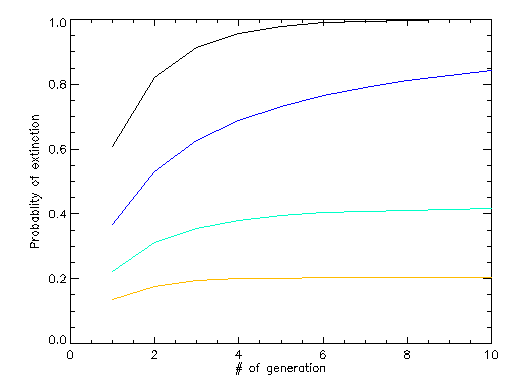Friday, time for stories.
基因消失的机率concerns the theory of extinction.
The parliatmenet of UK has an upper house and a lower house. The upper house consists of, for a good part, the heirs of lords whose ancestors many generations used to fight for the king. Now, each generation, a few of these seats became empty because some of the lords failed to produce a male offspring (new lords were created to fill these seats, but that's not the concern of this story). A study was made by mathematically proficient individuals, so this became the beginning of the extinction theory.
Everybody wishes that his/her gene would pass down generation after generation. Sadly, everybody will become extinct after some generations. A well know example is what happened after the Mutiny of Bounty (a good Oscar movie was made after this story). When the sailors settled on the small island of Pitcairn with their Tahitian beauties, there were 21 surnames. As the island was quite isolated, the inhabitants married between the families. A few generations later, there were only 7 surnames left.
As one might expect, the more children you (and your descendants) have, the less likely you will become extinct.
The number of children each woman has (the fertility) is roughly a Poisson distribution,
p(n,a) = (1/n!) a^n*exp(-a), a being the average number of children each woman has.
If a woman has no children, she becomes extinct (the first generation). However, she can become extinct if none of her children or grandchildren, etc have any children. If I call p(m,a) the probability of extinction at generation m, then:
p(1,a)=exp(-a);
p(2,a)=sum p(n,a)*(p(1,a))^n (because all children has to be childless)
=sum (1/n!) a^n*exp(-a) * p(1,a)^n
=sum (1/n!) (a*p(1,a))^n exp(-a)
=exp(-a(1-p(1,a)))....
This can be generalized to:
p(m,a)=exp(-a(1-p(m-1,a))) !
OK, now we can plug in some numbers....

The plot above shows the probablity of extinction of the male line with average fertility of 1, 2, 3 and 4 offsprings from top to bottom. If there is only one child on average, then by the 4th generation you will 95% die off. If you have two, being likely to have one a boy, then you can delay that demise to much later (20% still around after 10 generations). But if you have 3, you are ok if you can survive the first 3 generations because by then you would have a good number of descendants walking or crawling around...
算算基因消失的机率(the Extinction Theory)
所有跟帖:
•
你要知道男性的Y染色体是不进行基因交换的,因此可保持世代不变
-万枫-
♂
![]()
![]() (0 bytes)
()
09/26/2014 postreply
10:01:33
(0 bytes)
()
09/26/2014 postreply
10:01:33
•
所以我举的是父系灭绝的例子。
-borisg-
♀
![]()
![]() (0 bytes)
()
09/26/2014 postreply
10:32:31
(0 bytes)
()
09/26/2014 postreply
10:32:31
•
只看了标题没看内容,你说的就是父系。波大统计很牛啊,这样的人TF概率也是Poisson分布呢
-万枫-
♂
![]()
![]() (0 bytes)
()
09/26/2014 postreply
11:36:27
(0 bytes)
()
09/26/2014 postreply
11:36:27
•
厉害。书架上的生物化学和细胞生物学还在,
-星光华逸-
♂
![]()
![]() (29 bytes)
()
09/26/2014 postreply
19:28:09
(29 bytes)
()
09/26/2014 postreply
19:28:09
•
没想到 TT 上也可以 discuss Science。
-大百百-
♂
![]() (0 bytes)
()
09/26/2014 postreply
11:18:56
(0 bytes)
()
09/26/2014 postreply
11:18:56